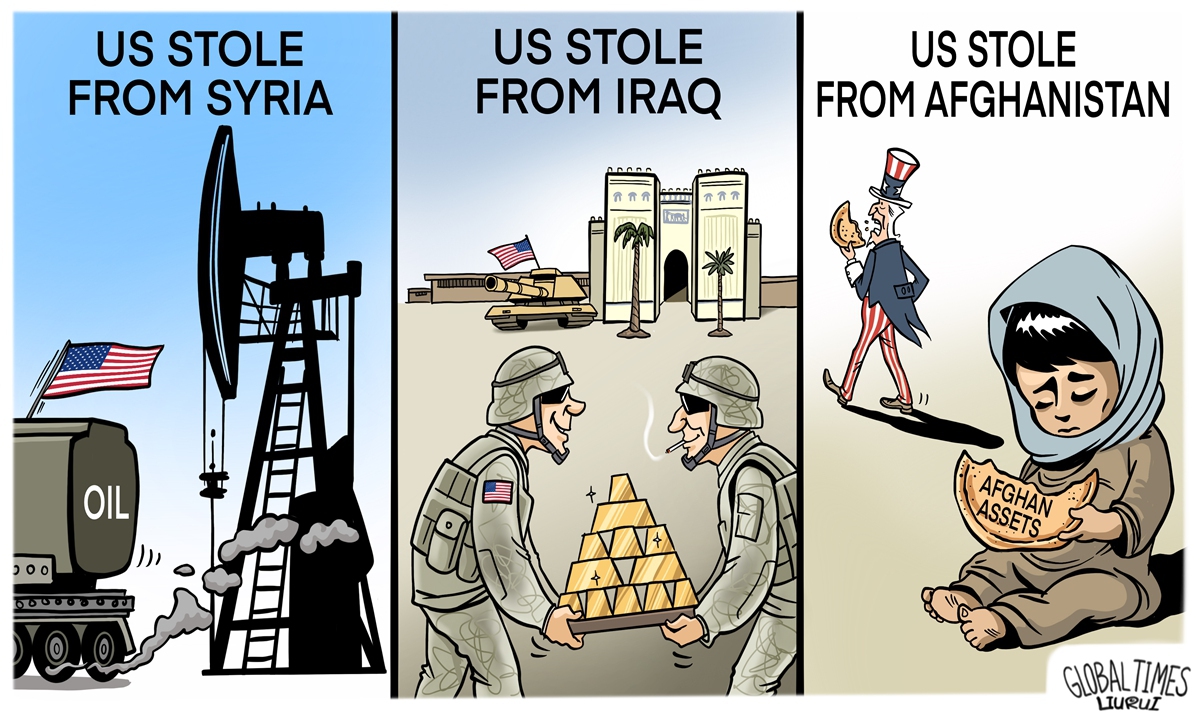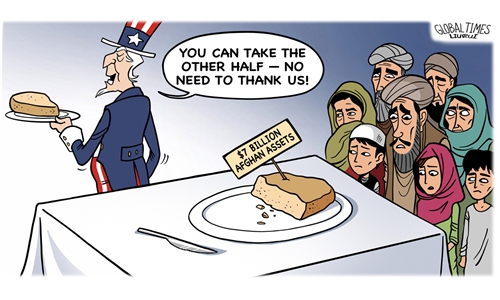
Illustration: Liu Rui/GT
Picture an old patient huddling under a patch of sunshine on his sickbed. He's breathing heavily through an oxygen mask, with his eyes half-closed and bones almost protruding through the wrinkled skin barely covered by a piece of worn-torn cloth. He has been like this for more than 20 years, alive but not living.Suddenly, a bulky figure blocks the sunbeam. The intruder lays his hand on the oxygen mask, pulls off the life support, cuts the oxygen supply by half, and thrusts the mask back. "That's enough for you to take in," he spits the words down and strides away. The intruder was the very reason why the old man ended up in a ward 20 years ago, when he beat the man almost to death without any justification.
This sad story is an example of the effects of the US war in Afghanistan. According to Anadolu Agency, the most conservative estimates by local and international rights group suggest that close to 47,600 civilians have been killed in Afghanistan during the 20 years of war since the US invasion. Among others fortunate enough to survive, the number of Afghans in need of assistance keeps rising. In 2021, more than 18 million Afghans required some form of "blood transfusion", nearly doubling the 9.4 million reported in 2020. The UN estimates that 97 percent of the Afghan people suffering the world's largest humanitarian crisis could fall into poverty in 2022 while facing a serious risk of widespread famine.
More than half of the country has already been in humanitarian need and the possibility of further deterioration is very real. The UN has recently requested nearly $4.5 billion in global aid for 2022, the largest humanitarian appeal ever. According to estimates, if no sufficient action is taken to support the country and regional response plans, "in 2023 we'll be asking for $10 billion".
The Afghan civilians, who had nothing to do with the 9/11 attacks, are bearing the brunt of stifling sanctions and assets freezing by the US. The result is a severe economic downturn that throws millions into poverty and hunger and sets Afghanistan back for generations, as UN Special Representative for Afghanistan Deborah Lyons pointed out. The US is not unaware of this. Four dozen US congressmen wrote to President Biden in December 2021 after America's hasty withdrawal, highlighting that US confiscation of $9.4 billion in Afghanistan's currency reserves would contribute to soaring inflation and the shuttering of commercial banks and private businesses.
But no one with a speck of conscience and compassion would expect the US to rob Afghans of their life-savings. The Biden administration recently announced the plan to dispose of $7 billion frozen assets held in the US, freeing up one half for families of America's 9/11 victims. The US chose to ignore the fact that the frozen assets belong to Afghan people who are also the victims of its post 9/11 counter-terrorism war and are in dire need of war compensation and humanitarian aid.
The US keeps Afghanistan's money as its own with a more despicable agenda, i.e., to vent its anger after the humiliating failure in Afghanistan, to punish the Taliban authorities that burst the bubble of US invincibility, and to warn other countries to keep succumbing to US hegemony. This ruthless "leader" is telling the world, if the US is not living a desirable life, no one else even has the chance to live a normal life.
As winter set in, at least a million Afghan children under five have been at risk of dying from starvation. These kids may have already lost their parents in the bombings by the US. But the orphans cannot escape the shadow of the US' abuse of power in the foreseeable future. Like previous generations, they will grow up learning that there will be two scenarios when the US treats others as inferior—when it invades a country and when it does not.
This will send more chills down the children's spines than the cold winter wind they are enduring. They will soon realize that the US is "generous" enough to torture them slowly rather than eliminate them in one single stroke.
The author is a commentator on international affairs, writing regularly for Global Times, China Daily etc.. He can be reached at xinping604@gmail.com.

